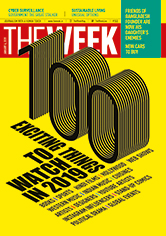Let peace prevail
Year 2019, by all means, looks exciting. There are so many things to look forward to, the biggest of them the general elections (‘High jinks in 2019’, January 6). Nobody knows who is going to be our next prime minister. I believe we will lift the cricket World Cup under the strong leadership of Virat Kohli. So many filmmakers are thinking creatively and there are a lot of biopics in store this year, in Bollywood and regional cinema, which is really interesting.
All said, I don’t want 2019 to be known for any wrong reasons. Let peace prevail in the world and inside us.
Raghunath K.,
Bengaluru.
Your cover story was extremely enjoyable, with a kaleidoscope of personalities and write-ups. The mosaic of individuals and events from different walks of life was truly a feast. That you allocated space for news and events of the week, even in a special issue like this, was commendable. Wish you all a happy new year.
K.V. Raghuram
Wayanad, Kerala.
Your cover story was a well-designed prospectus of excitements in store for us in 2019. Though the thrust was on literature, music, cinema and arts, fair representation was also given to politics and economy.
The illustrations, along with each segment of the cover story, helped enhance the appetite.
Raveendranath A.,
On email.
Singh and Modi
The only reason a leader shuns the media is out of the fear of getting thoroughly exposed on important issues concerning the nation (‘Power point’, January 6). Almost all our prime ministers have readily faced the press and answered all questions, however tricky and pungent they were, because they had a wide knowledge of most of the subjects.
We have never seen Manmohan Singh run away from the media. The renowned economist and the architect of the structured reforms that liberated India’s economy was confident of answering all questions. While Singh was a silent performer, Narendra Modi is a rabble-rouser and non-performer. While Singh’s silence was intellectual, Modi’s silence is out of indifference and ignorance. It is better not to compare the incomparable.
Tharcius S. Fernando,
On email.
Diverting attention
It was refreshing to go through Mani Shankar Aiyar’s column (‘Late wisdom, lame claim’, January 6). He appears to be in a hilarious mood while using his diatribes against Narendra Modi, least worried about the stormy reactions that could follow. GST was implemented in a hurry and it reflected the government’s plan to subvert the reaction that ensued from demonetisation.
Jaideep Mittra,
On email.
I agree with Aiyar that GST, in the first place, should have been simple. There was no need for it to be so complicated. The problem with the BJP government is that it takes the right decisions only when there is a setback in elections. If the BJP had won the elections in Madhya Pradesh and Chhattisgarh, perhaps it would not have brought in almost all articles below the 18 per cent slab of GST. Such a practice is not right. It is like fooling people.
Vismay Mathur,
On email.
Leave it to Supreme Court
It is disturbing to note that the Central government is planning to use the new surveillance order to snoop on private conversations and e-mails (‘Snooping to conquer’, January 6). With Lok Sabha elections a few months away, the Centre’s decision appears suspicious. There is no doubt that certain terrorist organisations are trying to radicalise Indian youth and it has to be prevented. But is this the way?
Already, there are many cases of snooping by the states as well as the Centre, and nobody knows what is going on. I hope the Supreme Court will take a final decision on this issue and would protect the privacy of honest citizens and serve the security interests of the government.
Snooping should be done in the rarest of rare cases, and only when national security is at stake. Freedom of speech and the right to criticise the government are enshrined in the Constitution and they must be safeguarded in a democratic set-up.
D.B.N. Murthy,
On email.
The government cannot treat every Indian as a ‘could-be wrongdoer’. It should respect a person’s privacy. Snooping is not the only way the government can tackle threats from Islamic State.
Also, the government should not curb dissent in any manner. Dissent or the right to protest has a place in all democracies.
Kushal Pandey,
On email.
Trivia and distortion
Your anniversary special issue on ten great battles that shaped India and its people was interesting (‘Rivers of blood’, December 30). An interesting trivia connects the Battle of Kohima with the Indo-Pak War of 1971. A.A.K. Niazi, then a captain in 4/7 Rajput Regiment, fought valiantly against the Japanese. It earned him not only a Mentioned in Dispatches, but also the nickname ‘Tiger’, which was given to him by his brigade commander. Later, in 1971, as the lieutenant general, despite his best efforts, Niazi was forced to surrender Pakistan’s eastern army to the Indian forces.
Brajendra Singh,
On email.
You have made the anniversary issue on historic battles cheap and of low standard. It seems like some reactionaries of the RSS have infiltrated THE WEEK, and they are foolishly trying to distort Indian history. No authentic history book was referred to while writing these articles.
Deshbandhu Dogra Nutan,
On email.
Less cricket
The sports coverage in your magazine is always cricket-centric. I hope you realise that the world does not revolve around cricket. There has to be good coverage of other sports as well in the magazine. The obsessive compulsive coverage of cricket must end.
Ramesh,
On email.

